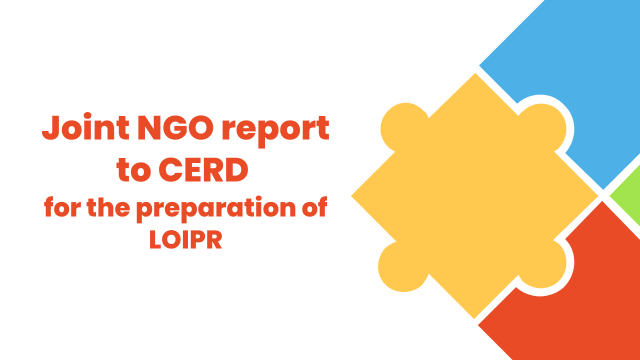Japan: NGO Joint Statement Calling for the Provision of the “Cash Handouts to Support Students” to All the Students in Need
May 25, 2020
May 25, 2020
NGO Joint Statement
Calling for the Provision of the “Cash Handouts to Support Students”
to All the Students in Need
On May 19, the Ministry of Education of Japan announced the establishment of the scheme of the Emergency Cash Handouts to Support Students for Their “Continuous Learning”, which aims to grant cash benefits to higher education students who face financial difficulties as a result of the COVID-19 pandemic so that they do not need to give up their education. We welcome the launching of the support for the “continuous learning” of students in need.
First of all, however, the number of eligible students under the scheme is some 430,000, which is very small and represents 10% or so of the students in higher education institutions and Japanese language schools. According to the survey on the students’ living conditions in 2016/17, conducted by the Japan Student Services Organization (JASSO), the proportion of the students who have problems or difficulties in pursuing their education only on the basis of the payment by their families and who receive no financial support from their families amounted to 36.0% in universities (full-time), 42.5% in master’s courses and 53.1% in doctor’s courses. Although approximately half of students in higher education take up part-time jobs to continue their education, many reports on the media show that there has been a sharp reduction in opportunities for students to work part-time, including because of official requests to refrain voluntarily from doing businesses in efforts to prevent the spread of COVID19. Although the eligibility criteria are linked with the reception of scholarships or the use of student loans (the criteria (6)), it is unreasonable to subject the present scheme to such conditions because it is aimed at supporting those who are facing difficulties because of COVID-19. The Ministry of Education should delete the criteria (6) and provide all students in need with the cash handouts.
Secondly, the scheme establishes additional criteria (7) only for students from overseas, requiring them to rank high in terms of academic performance. The purpose of the cash handouts is, however, to help students stay in educational institutions so that they can be involved in “continuous learning” amidst difficult living conditions caused by the COVID-19 pandemic. It is obvious discrimination on the basis of nationality to establish such different criteria only for students from overseas, in spite of the fact that the difficulties they face have nothing to do with their academic performance.
Since the launch of the “300,000 International Student Plan” in 2008, the Government of Japan has maintained the policy to accept students from overseas in a proactive manner. More than 340,000 persons stay in Japan with the “student” visa (as of the end of the year 2019), many of whom work part-time to keep studying in Japan. According to the survey on the living conditions of privately financed international students in 2017/18, conducted by the JASSO, approximately half of their earnings come from part-time jobs, and 75.8% of privately financed international students work part-time. The discriminatory criteria for the cash handouts, announced in this context, illustrate the opportunistic nature of Japan’s policy on students from overseas, which is far from the philosophy of “international contribution”.
According to the media coverage, the Ministry of Education states that “since the eligibility is to be examined by each university or other higher education institution, those students who do not meet the criteria may be eligible for the cash handouts”. If this is the case, there is no need to establish such criteria. We demand that the criteria (7) only for students from overseas be deleted and that the same criteria be applied to them on an equal basis with other students.
Thirdly, students who attend educational institutions other than “Article 1 schools” (schools defined in Article 1 of the School Education Act) or Japanese language schools are excluded from the scheme, even though they may also face risks to “continuous learning” as a result of the COVID-19 pandemic.
Japan is one of the States Parties to the Convention on the Rights of the Child, the International Covenant on Economic, Social and Cultural Rights and the International Convention on the Elimination of All Forms of Racial Discrimination, all of which require the government to ensure the right to learn for all children living in Japan on an equal footing, without discrimination on the basis of nationality, ethnic origin or other status.
In the autumn in 1998, a Graduate School of Kyoto University allowed a graduate from Korea University (Tokyo), a school in the ‘miscellaneous’ category, to take its entrance examination and admitted the student who passed the exam. The Ministry of Education responded in August of the next year (1999) by amending the Ordinance for the Enforcement of the School Education Act to expand the qualifications for entering graduate schools. Consequently, graduates from Korea University, which is not an Article 1 school but a school in the ‘miscellaneous’ category, as well as graduates from departments in Japan of foreign universities – Japan campus of Temple University (USA), Hakodate campus of Far Eastern Federal University (Russia), Japan campus of Tianjin University of Traditional Chinese Medicine, Tokyo campus of Beijing Language and Culture University and Tokyo campus of Shanghai University, all of which are not Article 1 schools – are now qualified for entering graduate schools of universities in Japan.
In the light of the international human rights standards as well as the above-mentioned history, students of these schools should also be included in the scheme to support “continuous learning” of those in need. Korea University and some of the departments in Japan of foreign universities have postgraduate courses, which should also be included in the scheme.
On the basis of the above, we strongly demand that the Ministry of Education and the Government of Japan withdraw the criteria (6) and (7) for receiving the cash handouts, with a view to including all students in higher education institutions, including Korea University and departments in Japan of foreign universities, in the scheme to support their “continuous learning”.
signatories
Solidarity Network with Migrants Japan (SMJ)
Japan Network towards Human Rights Legislation for Non-Japanese Nationals & Ethnic Minorities
Japan NGO Network for the Elimination of Racial Discrimination (ERD Net)
NORIKOE Net
The International Movement Against All Forms of Discrimination and Racism (IMADR)
contact: Solidarity Network with Migrants Japan (SMJ)
Tel: +8-3-3837-2316 smj@migrants.jp





